Four Croatian Healthcare Innovation Projects Selected for EU Funding
ZAGREB, 26 June 2022 - As many as four Croatian healthcare innovation projects are included among 20 projects from central, eastern and southern Europe selected for financing by the European Institute of Innovation and Technology (EIT) under the Regional Innovation Scheme.
Eighty projects have applied for funding, and four Croatian ones have been selected, more than from any other country in the region, the Večernji List (VL) daily said on Sunday.
The EIT Health Regional Innovation Scheme supports the development of innovation in healthcare in the countries of central, eastern and southern Europe. The consortia behind the selected innovations will be granted up to €75,000 for further development of products or solutions, mentoring, a place at a bootcamp, and access to potential investors and partners through EIT Health, a network of top healthcare innovators in Europe.
The selected Croatian projects are: MEGI, PsyFlux, StressLyft and the Human-Machine Interface.
MEGI aims to develop an AI-enabled virtual cardiovascular health assistant that uses personalised protocols to remind patients to take medication and measure their blood pressure at home.
The PsyFlux consortium is developing a telemetric intracranial pressure monitoring device that can be used outside the hospital without infection risks, allowing the patient to partake in everyday activities.
StressLyft is an educational course about workplace stress and stress relief skills, based on interactive video content, which companies provide for their employees to prevent work-related stress.
The gesture-based human machine interface for guided orthopaedic surgery aims to develop novel medical devices that help surgeons to make millimetre-precision measurements during hip replacement surgery and possibly other types of operations.
"Our aim is to find the best ideas and early-stage innovations in the region and encourage players from business and academia to build consortia and turn their concepts into realities," Mónika Tóth, EIT Health InnoStars RIS Programme Manager, was quoted as saying.
For more, check out our politics section.
Secondary Vocational School's Protection Workshop Nominated for European prize
7 March 2022 - The Varaždin Secondary Vocational School's Protection Workshop is one of 34 projects in Central Europe nominated for the SozialMarie 2022 best social innovation prize, Varaždin County said on Monday.
The Protection Workshop is among 275 shortlisted projects. It is competing with projects from Austria, Hungary, the Czech Republic and Slovakia for the €15,000 first prize, the €10,000 second prize, the €5,000 third prize, or €2,000 for the next 12 places.
The Protection Workshop is a joint project of the school, the county, and the Croatian Employment Service that was launched in 2006 to enable the employment of persons with disabilities or reduced work capacity, the first such project in Croatia.
The workshop makes work uniforms, protective clothing, chair covers, bedding, bags, backpacks, textile and leather accessories. In 15 years it has employed 58 persons, including 30 with disabilities.
Each year SozialMarie awards successful and innovative projects, representing a sign of quality in effective social innovation. The winners will be announced on 1 May.
This is the first European prize for social innovation that has been given since 2004 for 15 of the best projects. SozialMarie is also a public platform for making connections, cooperating and exchanging experiences between Central European projects.
Pioneers of First Croatian Electric Scooter Announce Crowdfunding Campaign
March 25, 2021 - In a time and place where people are desperately searching for transport solutions to environmental problems, car traffic, crowds, and limited amounts of parking, especially during the tourist season at hotels and parks, the Croatian company IDDI decided to step forward and design the first Croatian electric scooter.
IDDI d.o.o. has announced their crowdfunding campaign on the Croatian platform CroInvest this week, where the goal is to raise the amount of HRK 250,000 for the completion of production and for R&D to make the world's first electric scooter from biodegradable materials.
IDDI, under the Rolla brand, has developed a product package consisting of the first Croatian electric scooter with a charger and a mobile application, designed and developed for the rental concept. The team, lead by Ivan Šimatović, consists of a group of young visionaries and engineers who want to prove to everybody that Croatia is ready to design and produce high-tech products and be part of the solution to the global problem of transport and climate change.
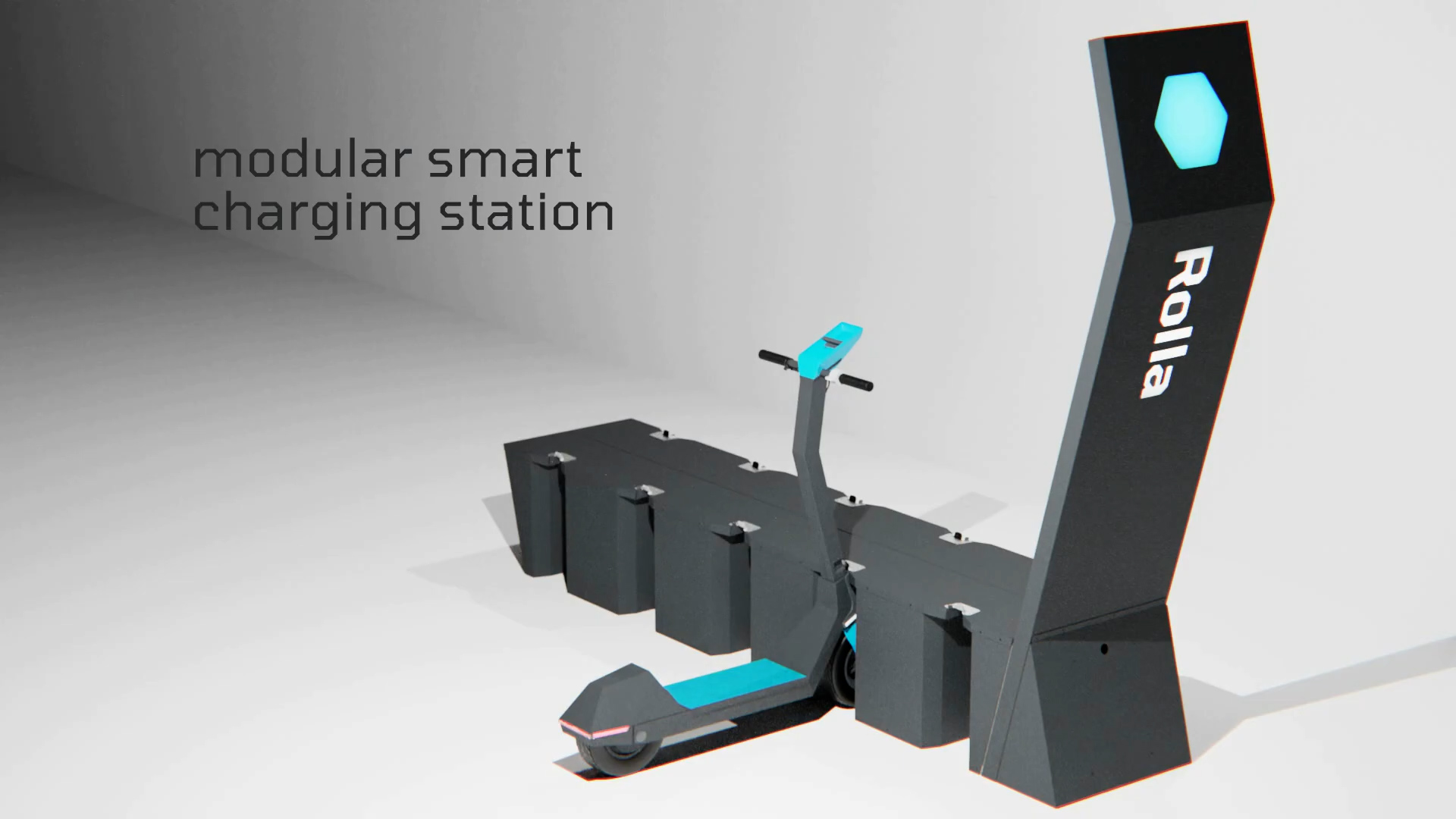
The Rolla charging station (Image: IDDI d.o.o.)
By offering high-performance scooters, advanced safety systems, and smart sensors that limit speed in populated areas at an affordable rental price, IDDI wants to change the negative public perception caused by the use of inappropriate and often insufficiently safe electric scooters. The Rolla scooter is also weather-resistant and has all-terrain big wheels, allowing it to adapt to almost any circumstance.
Take a better look at the Rolla product package:
According to the team, the Rolla project will also offer its users the opportunity to enjoy the beautiful outdoors and tourist attractions in Croatia, such as the Plitvice Lakes, in a more innovative and interesting way. The company has signed contracts with 4 renowned Croatian hotels for this tourist season, and the plan for the delivery of scooters is planned for mid-April.
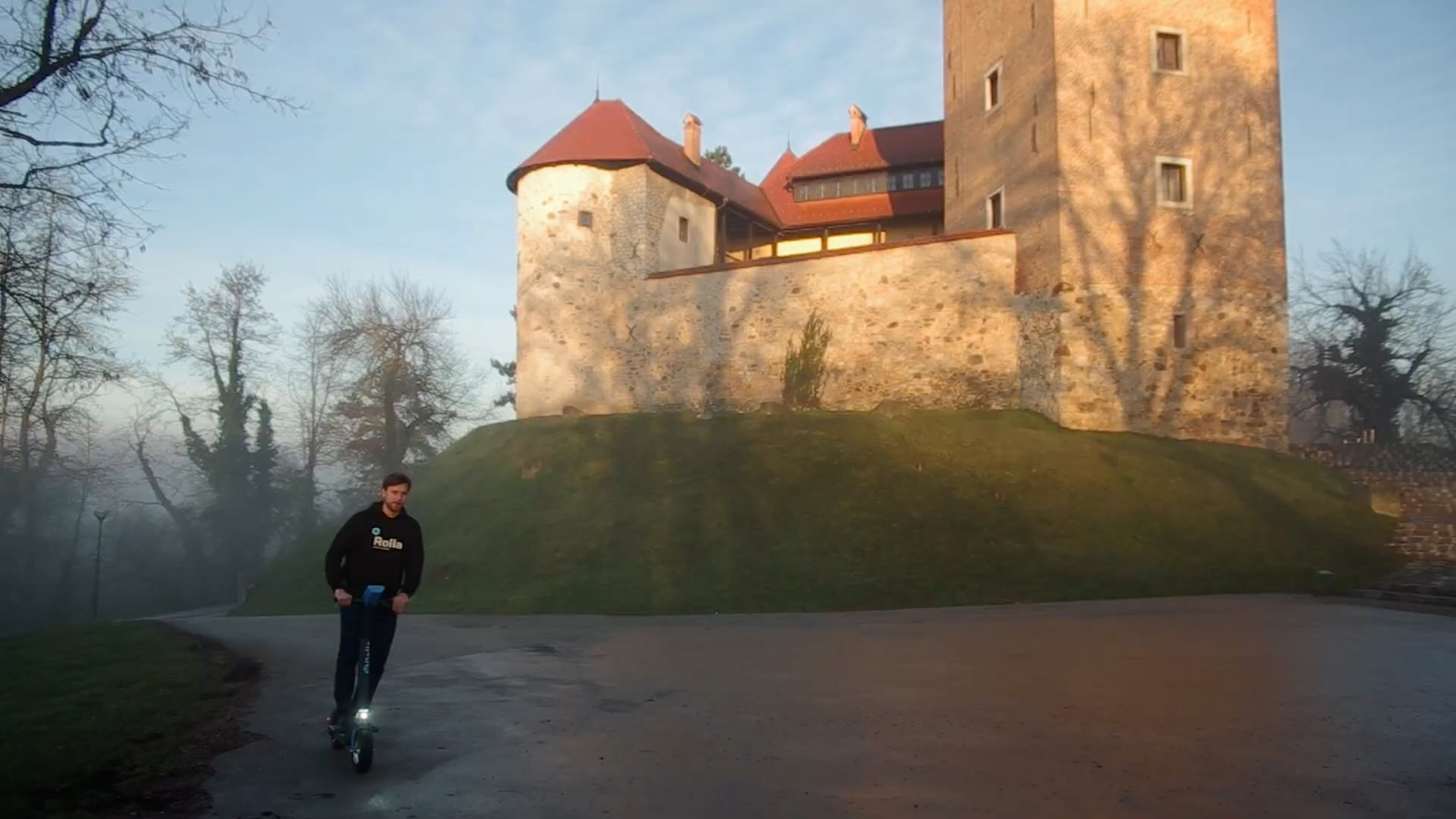
Rolla isn't made just for the city, but for almost anywhere in Croatia. (Image: IDDI d.o.o.)
IDDI d.o.o. and the Rolla project have been already recognized by HBOR (the Croatian Bank for Reconstruction and Development) through the credit line entrepreneurship of young people, women, and beginners under the guarantee of ESIF, and has close cooperation with Croatia’s National Tourist Board.
Learn more about the Croatian innovators behind the project:
You can read more about the project HERE.
For more about everything made in Croatia, be sure to follow TCN’s dedicated page.
Croatia Longboards Offer Cool and Green Around-Town Travel
ZAGREB November 19, 2020 - Noticeably bigger than a skateboard, longboards are a cool alternative to urban travel. Meet Croatia's first longboard manufacturers, Crushboards, whose eco-friendly products are healthier to use and way more stylish than other green options
You can walk around some European towns and cities and wonder just where the future is going to fit in. The narrow streets seem to want to accommodate only cars, with pedestrians demoted to the narrow edges. Zagreb isn't like that. Osijek and other towns and cities in Croatia are not like that.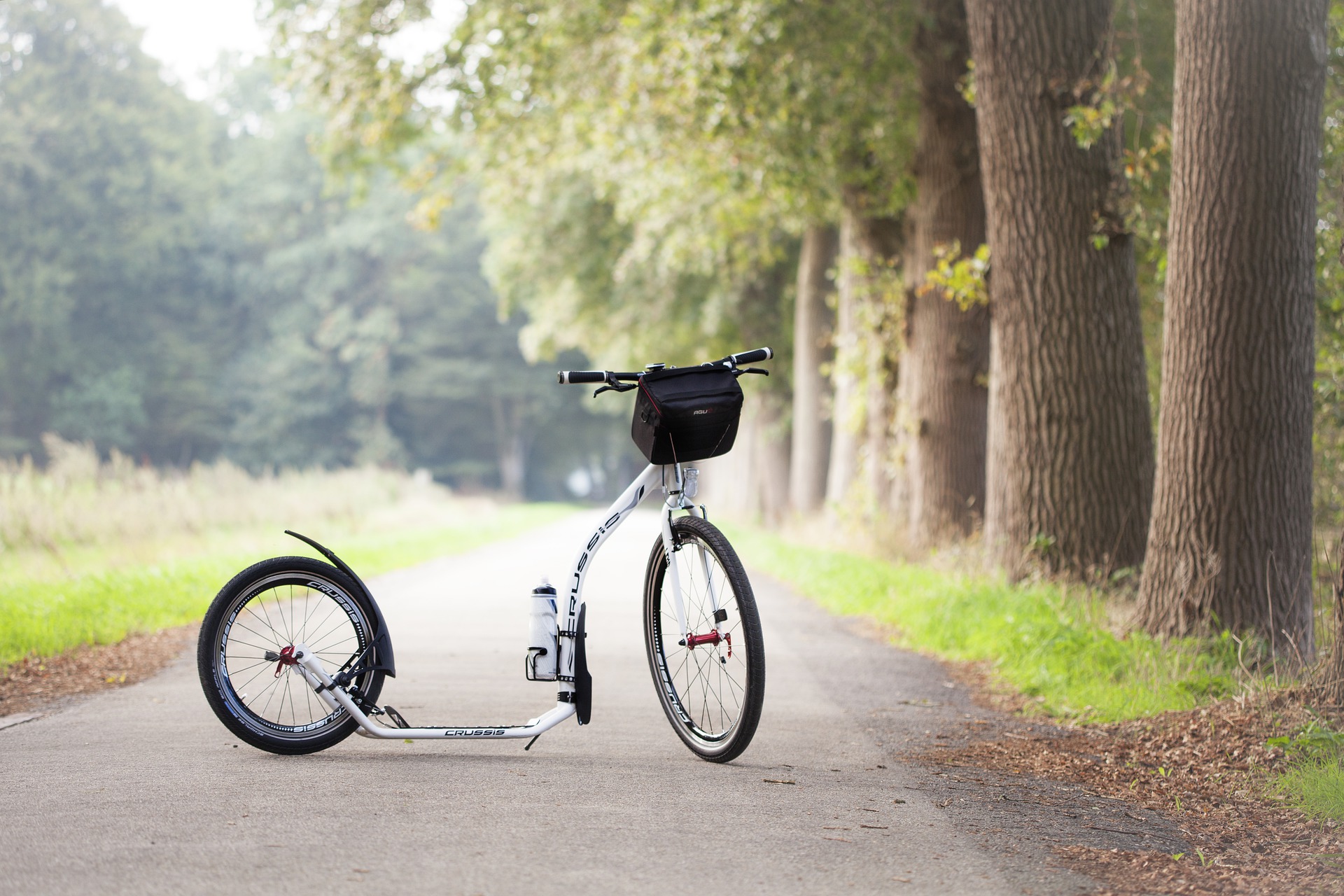 With 220 kilometres of dedicated cycle paths, the city of Zagreb and its residents have been quick to adopt the latest green-friendly ways of getting around the urban environment
With 220 kilometres of dedicated cycle paths, the city of Zagreb and its residents have been quick to adopt the latest green-friendly ways of getting around the urban environment
You only need take a glance at the generous cycle paths around Zagreb to see that this is a city that could easily take on the challenges of a future not reliant on fossil fuels – electric scooters, foldaway bikes, gyroscooters, electric skateboards and monowheels have joined bicycles on the streets of Zagreb as an easy means to get round the city. Could longboards be the next popular choice?
Started by three lifelong friends from Čakovec, Crushboards is the first company in the country to make Croatian longboards. Like a skateboard, only bigger, longboards are well suited to the urban environment of a city like Zagreb.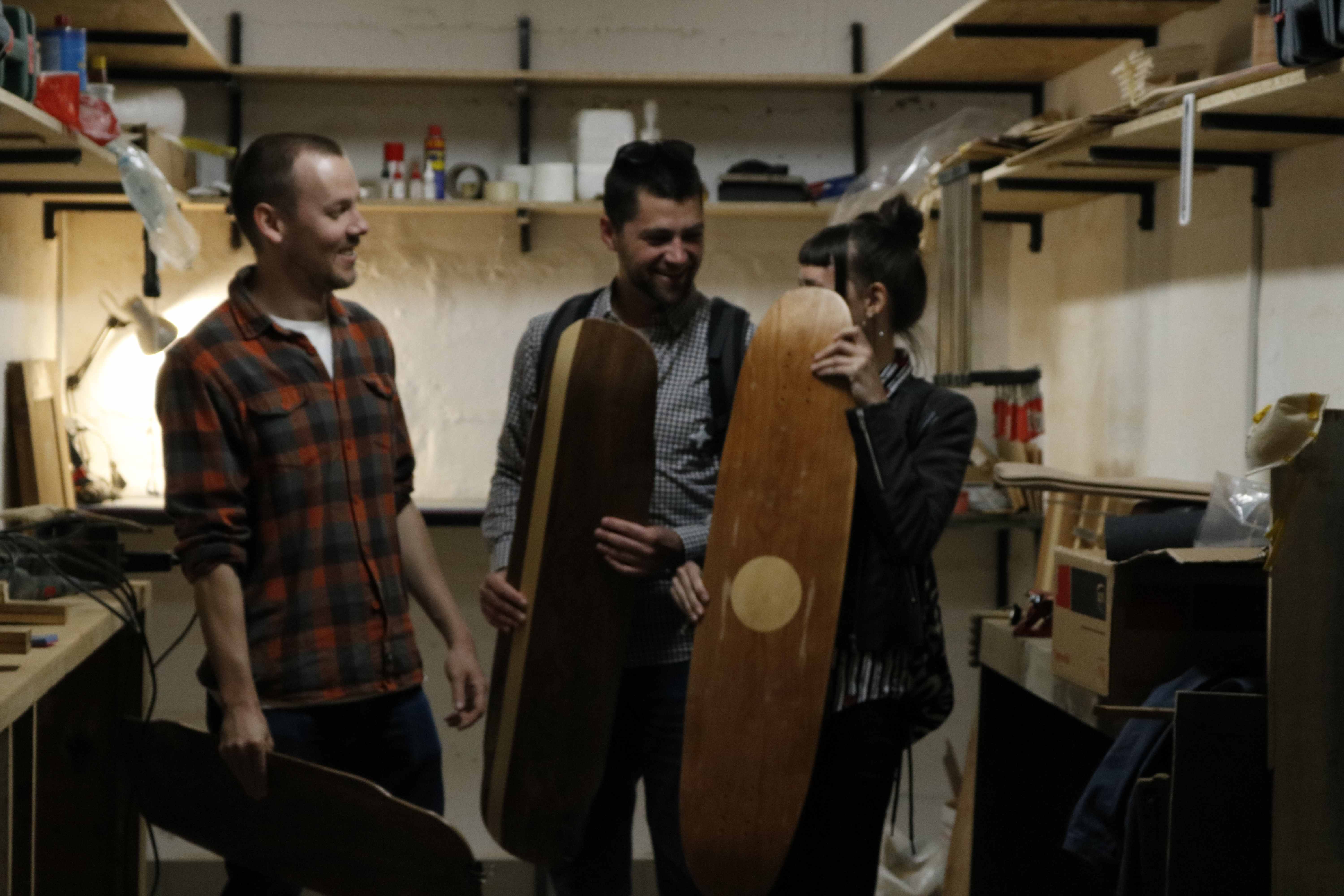 Čakovčani (l-r) Marko Hlebar, Davor Nikolic and Sanda Bogdan inside the Zagreb workshop of Crushboards © Vedran Pažin
Čakovčani (l-r) Marko Hlebar, Davor Nikolic and Sanda Bogdan inside the Zagreb workshop of Crushboards © Vedran Pažin
“This board is longer than a skateboard - 100 centimetres in length.,” Crushboards co-founder Marko Hlebar told TCN when we went to visit their workshop in Zagreb. He runs Crushboards with Davor Nikolic and Sanda Bogdan. “It's a bit heavier than a normal skateboard and uses different wheels. You can perform different tricks on each, dependant on the weight of the board, but the main thing for us is that a longboard is easier to ride on in the urban environment, in the city.” Practising on a Crushboards longboard inside a Zagreb park. The boards are intended as much for a regular inner-city commute as they are for such trickery
Practising on a Crushboards longboard inside a Zagreb park. The boards are intended as much for a regular inner-city commute as they are for such trickery
“The wheels are larger so it's easier to travel on one of these in the city than it is on a regular skateboard,” Marko tells us. “It's better for travelling to work or to appointments, your feet get less tired.”
Rather than being the latest cool evolution in skateboards, it turns out that longboards have been around for a long time. In fact, the very first skateboards that were made probably looked more like the hip, eco-friendly product made by Crushboards than a regular skateboard.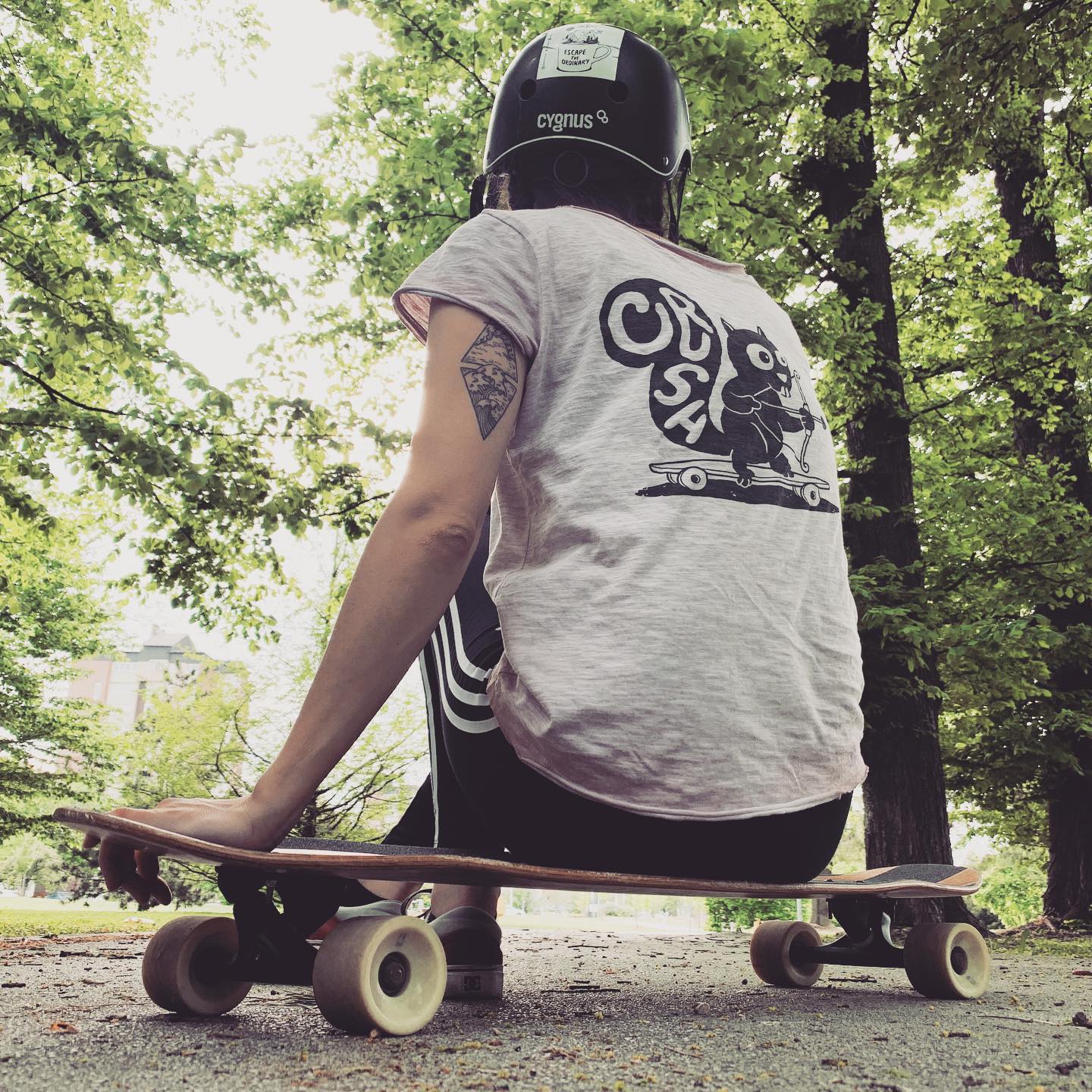 Crushboards see their main product as part of a lifestyle choice - so, it's little surprise to learn they also make their own super-cool t-shirts and accessories
Crushboards see their main product as part of a lifestyle choice - so, it's little surprise to learn they also make their own super-cool t-shirts and accessories
Skateboards were first made in America during the 1940s as a practice board for surfers who were prevented from taking to the waves because of bad weather. But, during its infancy, there were few options available to manufacturers in the skateboarding industry – boards were made using rollerskate wheels, whose size demanded a board closer to that of today's longboard.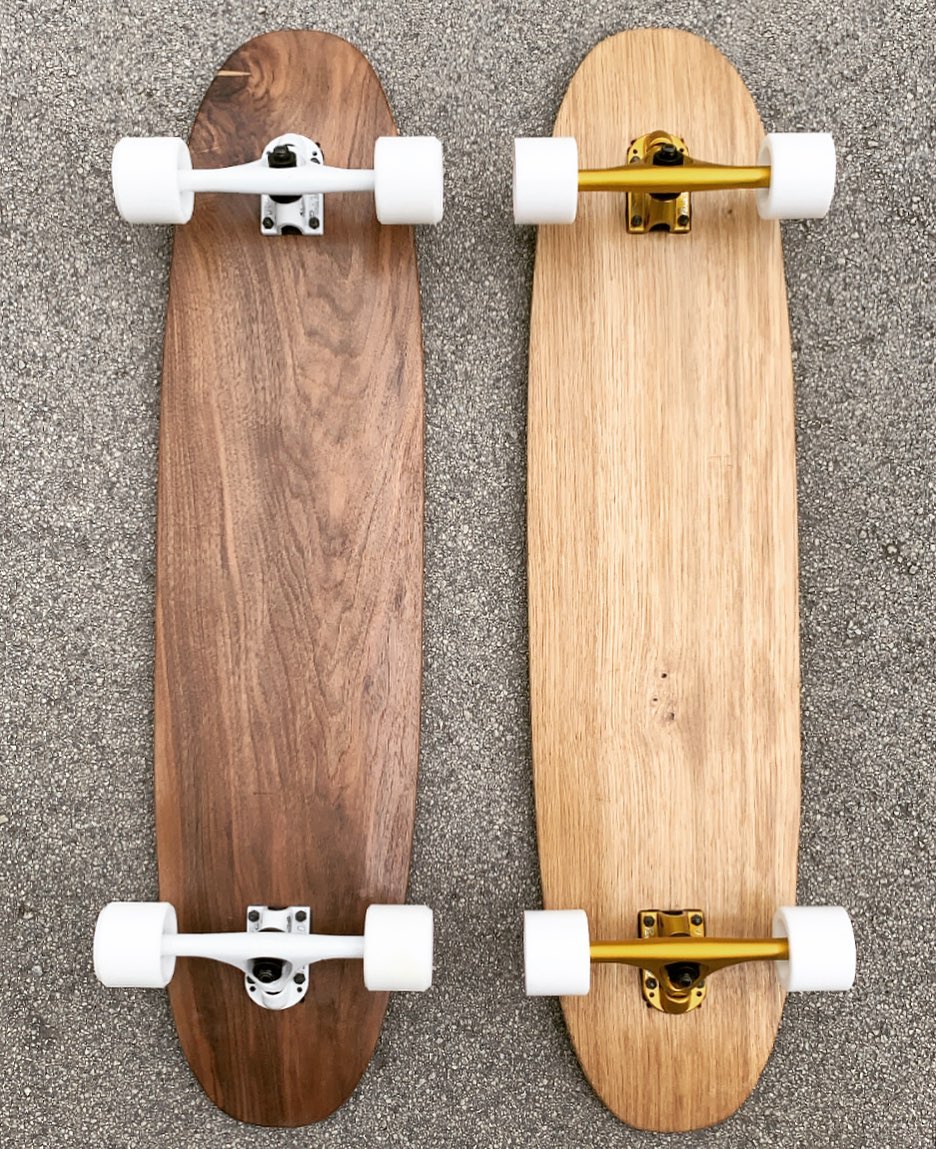
The longboard was, therefore, the first popular urban skateboard and remained so until the 1960s. It has fallen in and out of fashion ever since – the development of ultra-fast wheels saw them rise again in popularity due to them being well suited to downhill racing (the bigger board better absorbs the vibrations produced from speed). The relatively recent phenomenon of longboard dancing has also increased the boards' popularity in Asia.
Like regular skateboards, several different types and designs of longboard exist for different uses. The ones currently made by Crushboards are specifically designed for urban travel. Their boards are made using several thin layers of different materials, which strengthen and provide flexibility when glued together. They are finished on the top side with either oak or walnut, with the other layers holding cherry, teak, fibreglass, carbon, kevlar and two veneers. The wheels and their mounts are currently imported, but Crushboards hope to eventually source as much of the materials required from sustainable sources within Croatia.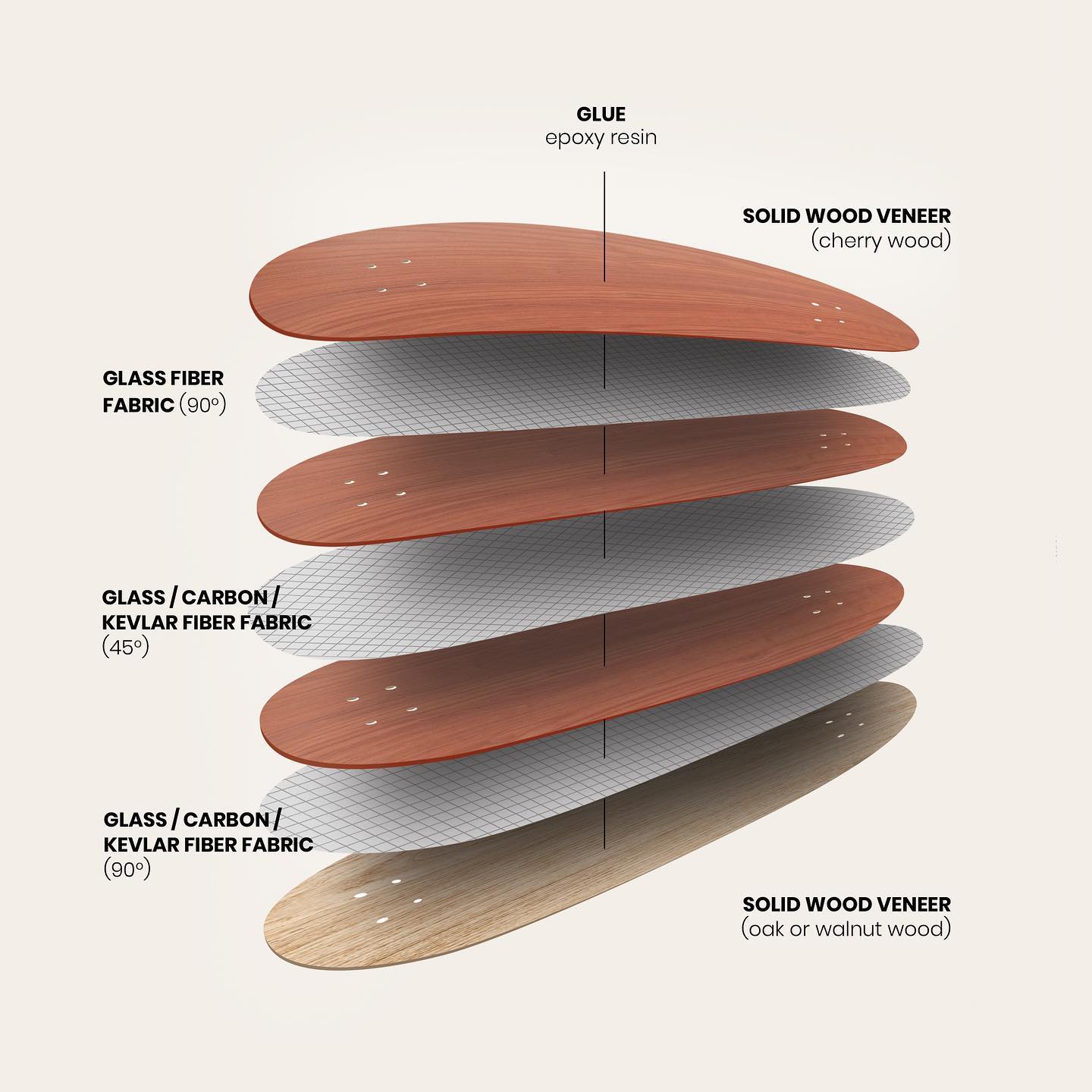 Inside one of Crushboards' longboards
Inside one of Crushboards' longboards
With 220 kilometres of cycle paths occurring throughout Zagreb, the Croatian capital is quick to embrace green modes of transport. Many Croatians are also health-conscious – a motorised scooter or skateboard might get around the city quickly, but they don't increase your exercise quota. Perhaps there's room on Zagreb's streets for these cool urban alternatives to the skateboards of our youths?
All uncredited photos © Crushboards
Croatia First in World to Use Contactless Card Payment Tech for Online Customer Reviews
July 24, 2020 - Croatia first in the world to use contactless card payment technology (NFC) for online customer reviews, a game-changer for business globally
In the modern era, there's no better promotion for your business than online customer reviews. Comments and ratings on platforms like Trip Advisor, Google and Facebook have replaced slow and unreliable word-of-mouth recommendations in the digital age.
But, how to get those reviews? A huge proportion of goodwill from satisfied customers is lost forever the moment they step out of the door. They can forget every detail of your business, their experience or maybe they just don't find the time.
Review Booster Pro, an innovative platform from Dubrovnik, offers the best solution yet. It uses NFC – the same technology used by credit cards for contactless payments – to facilitate on-the-spot online customer reviews in super-fast time. It's a simple solution that could be a game-changer for business globally.
“I'm the CEO and owner of the Mint Media digital agency,” explains Ivan Ivušić who has developed Review Booster Pro.”We work with a lot of clients in the tourism sector. Over the past few years, we got a lot of requests from clients about how to improve their online reputation. Their main concern was how to improve their ratings and increase their number of reviews of Trip Advisor, Google, Facebook and other platforms, in order to get more visibility and more customers.”
“We tried many different solutions; business cards with QR codes, something you scan with your mobile phone which would take you to a web page where you write reviews. But, the main problem was the speed. Once customers leave a venue, they don't find the time to write reviews or they don't remember the name of your business. So, the conversion rates were low. So, we needed something quick and simple, so customers can leave reviews on the spot. This is what the market needs.”
Their solution was to employ NFC - Near Field Communication, the technology you use to pay contactless with your credit card. All newer mobile phones are fitted with this technology. Businesses signed up to Review Booster Pro have RBP boards, which they present to customers after their experience – for instance, while you're waiting for your restaurant bill. You simply wave you phone over the board, the phone's operating system reads the chip, your web browser opens automatically and takes you to the RBP landing page of the business you're in. You then select which of the platforms you're already signed up to - Trip Advisor, Google, Facebook etc. - and leave your online customer reviews.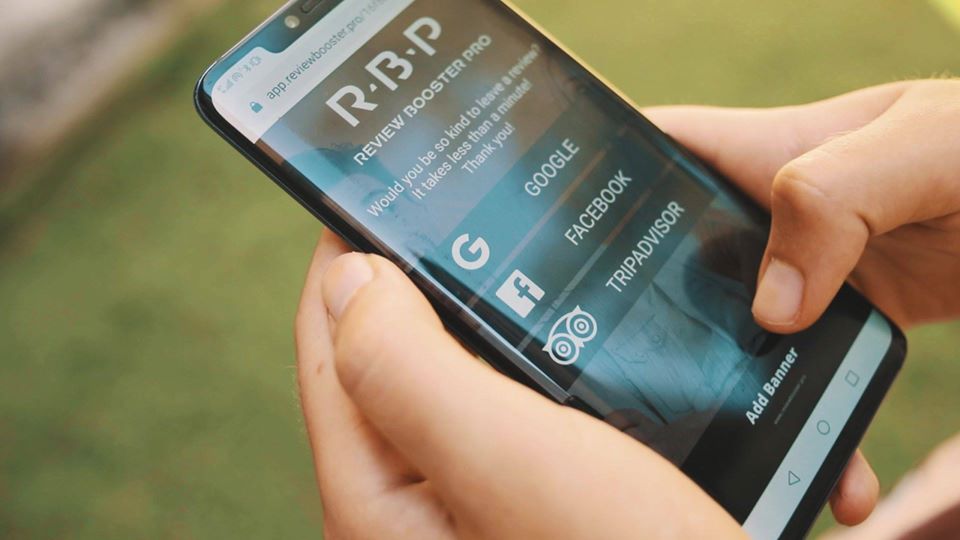
© Review Booster Pro
“The RBP boards are around the size of a large mobile phone – and these can be presented to the customer or even positioned permanently on every table in your bar or restaurant; hotels, dentists, hair and cosmetic salons, retail stores, tourist guides and agencies are also some of our clients,” explains Ivan. Aside from encouraging simple and super fast reviews, businesses using the RBP platform obtain other benefits. On their RBP landing page, where they can place their branded logo and individual text, they can also use banner advertising space to promote existing partners or market different sections of their business. For instance, while a customer is leaving a review of the hotel bar, they will be shown the details of what's on offer in the hotel's spa.
Business owners can measure the clicks on each individual board they have. Therefore, a restaurant owner will be able to see which of his staff is obtaining the most reviews. Previously, such information would have been complete guesswork, unless an individual server is specifically named by a customer in a review.
“All of our current clients were already well aware that this is exactly what they need,” says Ivan. “It took about 10 minutes to sell each of them this product. In our extensive preliminary testing, businesses that were averaging 3 reviews a day went up to receiving 15 reviews per day. It's really a game-changer.”
Future plans for RBP are extremely exciting and they are already searching for ways to move the technology into different forms – imagine having the RBP chip implanted within a laminated page at the end of your restaurant menu. But, for now, the next step is to be recognised by one of the biggest three review sites.
“Trip Advisor has a separate platform (RCP) which you can partner with, to offer projects that will get them more reviews,” says Ivan. “Our product will be particularly beneficial to them because it not only increases their number of reviews, it also increases user acquisition.”
“We are processing our application to become one of these partners. They have different tiers of partners, so if you are successful and reach the top, Trip Advisor then promotes you as a solution to all the businesses worldwide who hold accounts on their platform. That's our goal. And I have every confidence we will reach it because all other solutions rely on software, many on downloading a separate app. We found no other solution in the world right now that is using NFC technology for this.”
Croatian Companies Face Strong Competition and Require Innovation
Croatia's EU presidency during the first half of 2020 will be a great opportunity for our country, its promotion and the Croatian economy. Luka Burilović, President of the Croatian Chamber of Commerce (CCC), spoke with Novac/Adriano Milovan about the Croatian Presidency and about the challenges it faces within the new financial framework of the union and the use of EU funds. These topics were also the focus of today's conference titled: "Invest EU: Investment Incentives and Expectations for the Croatian EU Presidency", which was co-organized by Hanza Media at the Esplanade Hotel in Zagreb, where Burilović was a participant.
Croatia will soon assume the EU presidency. How do you evaluate the goals of the Presidency presented by Zagreb officials?
- The priorities of "Developing Europe" and "Connecting Europe" have distinct economic dimensions. With this we are sending a powerful message that economic growth and sustainable development are at the top of the list of national and European priorities in the upcoming period. These goals are achievable and, if realized, we can strengthen our position as a serious and successful partner in the international environment.
How do you view the Union enlargement process? After Croatia's accession to the EU, it appears that further enlargement is “on ice”, which can also be seen by the EU's decision not to open accession negotiations with Albania and Northern Macedonia. How should Croatia be positioned towards EU enlargements in Southeastern Europe and what could it contribute to the Croatian economy?
- EU enlargement is a politically, economically and security relevant topic. It is of importance to Croatia because this is a neighborhood with which we have certain unresolved issues, but also strong economic ties. The region has traditionally been an essential market for our businesses. It is our interest to continue the enlargement process, but it is not possible to predict accurately when, to what extent and with what dynamics this will occur. The fact remains that our "neighbors" are bound by long-term economic interests, regardless of whether they are EU members.
How is the Croatian Chamber of Commerce welcoming the Croatian Presidency of the European Union? What will it mean for the Chamber?
- Of course, the chairmanship is an opportunity to give the CCC events which it normally organizes even more meaning and resonance. An economic forum with significant players involved, regarding statesmen, institutions and companies, would certainly be a greater opportunity for cooperation. But it's secondary. It is much more important to see how we can influence policies. Our sectors analyze the needs of members to see how we can better promote our interests at the right moment. The question of all questions is, of course, budgeting. We have the potential to establish a better beginning position for our economy.
In Croatia, much has been said in recent years about fostering innovation. You recently pointed out that Croatia is a country with a long tradition of innovation which continues today. Nevertheless, the fact is that by spending less than one percent of the GDP on research and development, Croatia is at the very bottom of the EU and far from the EU average and proclaimed targets?
- A combination of factors is needed to change the situation. We begin from a situation that drives us to be creative, innovative and different from others in order to survive. We need a higher-quality scientific research community. We need a clear strategy and a stimulating financial framework for investment in research, development and innovation. Ultimately comes the part of the story with the highlights. We need to have resources available for investment and research and development.
In your opinion, what are Croatia's biggest innovations? What can we offer Europe and the world?
- As a small and open economy, Croatia is exposed to strong competitive pressures from the global market. For businesses to survive, they are compelled to find new and more effective solutions. Innovation is a necessity for us. Some of the advantages are having a quality academic staff in the faculties of technical and natural sciences and a strong IT sector, which is a prerequisite for development in today's digital age. The substantial amounts available from the EU research and development funds, which will continue to be available in the new financial framework, should not be neglected.
How do you evaluate the use of EU funds in Croatia so far? The government has boasted that major steps have been made here, but the European Commission figures show that we are still at the very bottom of EU rankings. Why is that so?
- The current value of the disbursed funds is at 28 percent, but we should bear in mind that funds from the existing financial reserves will be disbursed until the end of 2023, and I am optimistic about this realization. We know from the experience of entrepreneurs that they are plagued by inadequate competition and lack of information. They are also discouraged by the complicated procedures and duration of the evaluation process.
In which segments should we strengthen the use of union funds to make them an engine for economic development? And how do we reduce the portion that we must put back into the EU budget, which is about 10 percent of the withdrawn funds?
- These funds are not or should be a major impulse to stimulate significant economic growth. When it comes to areas requiring additional funding, it is about making a major investment in research and development with the goal of bringing as many innovations as possible to the EU to compete globally with countries such as the US and China.
Shortcomings in establishing procedures as well as in the implementation of those procedures have already been identified during the use of EU funds. Consideration should be given regarding how to make the process easier for applicants and users of funds.
What are the chances of Croatia establishing a new EU financial framework for 2027? As it stands now, less money will be allocated to us than within our current financial framework?
- Of course, within the framework of EU policies, Croatia sets its own priorities, i.e. the sectors and areas for which we will be able to spend EU funds. Therefore, the financial framework depends primarily on how we plan for the next financial period. The solution is to adopt the Croatian Development Strategy as soon as possible and propose operational programs based upon it. There is no doubt within the CCC, that the ecosystem for the development of entrepreneurship, innovation and exports must be at the top of our priorities.
Although Croatia has, cumulatively, attracted large foreign investments since independence, we still chronically lack greenfield investments, which would create jobs and stimulate exports. What should be done in this regard?
- Creating a stimulating investment environment is a process from the ground up. It requires a solid macroeconomic framework, tax policy, various targeted sectoral incentives and the availability of a quality workforce. It also requires a tailored education system for industry development, a dependable legislative framework, a geostrategic position, and transport connectivity...
It is imperative to open the door to new investments with high-value products, by making investments in research and development and the creation of products for export. Croatia is not an investment destination for cheap labor, nor should it be. We should target investors who will raise the standard of workforce that Croatian professionals already enjoy abroad, so that we could also achieve it in Croatia.
More information about Invest EU can be found here. And information about the Croatian Chamber of Commerce can be found here.
Please follow our business section for updates and developments in Croatia.
Croatian Innovation Provides Solutions in 5 Continents and 89 Countries
This Croatian startup currently employs 45 people. Its income in 2013 was thirteen million kuna, last year it reached 35 million, and in 2019, 50 million kuna is expected.
As Poslovni Dnevnik/Bernard Ivezic writes on the 20th of May 2019, the Croatian startup Zipato develops and manufactures smart home systems, which results in a Croatian solution that can compete globally with the likes of Apple, Google and Samsung. Just recently, 10,000 central ''Zipabox'' smart home computers have been delivered to the USA from right here in Croatia.
With that contract, the Croatian company concluded its single biggest job so far. Sebastian Popović, the co-founder of the former Vodatel, who is today the co-founder and director of Zipato, didn't want to delve too deep into the details of this contract, but he emphasised the fact that it was so significant that the production of Zipabox systems has moved to Zagreb.
For nine years now, 30,000 pieces of the same product but in its smaller series were sold across the Atlantic in America. Since then, far bigger orders have been dealt with by developers and OEM partners who have been equipping a larger number of apartments and various business premises with Zipabox's system.
"I expect there will be more similar contracts," stated Popović.
Sebastian Popović, along with Damir Sabol, is the only Croatian entrepreneur who has managed to build a profitable startup on the Croatian telecom market and then sell it successfully. Sabol sold Iskon to Croatian Telecom for 100 million kuna back in 2006, and Popović sold Vodatel to the former Metronet (currently integrated into A1 Croatia) for 80 million kuna just one year later. While he was in Vodatel, he developed the "eTV media centre", a computer that is the counterpart of today's well known IPTV set-top box.
Moreover, his former Vodatel was the first in Croatia to launch IPTV as a commercial service back in 2005. It had almost all of the functionality of today's IPTV, including video on demand. After the sale, Vodatel briefly moved to the building industry, but the global financial crisis, which hit Croatia in 2008, pushed that Croatian company back towards technology.
"We started nine years ago when we imagined ourselves quickly developing hardware and offering a smart home service in Croatia. However, we needed three years just to be able to show the first version of Zipabox," Popović noted.
He added that despite this, the hard work and effort definitely paid off. Although there were already many devices on the market and various smart home sensors around, either they weren't properly compatible with each other, or their installation and connection required large and burdensome investments.
"From the outset, we attracted the interest of customers from different parts of the world, mostly from some of the most developed countries, and they started contacting us and distributing and promoting Zipato in their countries," Popović said.
Today, the Croatian Zipato is present in an impressive 89 countries and across five continents. On its platform, more than 300,000 IoT devices are currently connected to 50,000 households and other spaces. The big business opened up its doors when this Croatian startup started to work directly with integrators and developers in the construction industry, instead of just with individual customers and distributors, who were so well equipped with new builds.
Popović emphasised the fact that they have had contacts with such companies in that industry since as far back as the year 2000.
As stated at the beginning, this impressive Croatian startup employs 45 people, it saw income of thirteen million kuna back in 2013 and as much as fifty million kuna is expected this year. In the last four years, they have also begun to contract OEM deals for telehandlers, power companies and other utility companies.
Make sure to follow our dedicated business and Made in Croatia pages for much more.
Click here for the original article by Bernard Ivezic for Poslovni Dnevnik
Team from Zagreb's FER Wins SIM(P)ATIC PLC+ Challenge 2019 Competition
As Poslovni Dnevnik writes on the 17th of May, 2019, the regional student competition, held at the Faculty of Electrical Engineering and Computing in Zagreb, marked the completion of the SIM (P) ATIC PLC + Challenge 2019 project.
This project, initiated by the student association EESTEC and supported by the faculties of electrical engineering in Croatia, Slovenia and Serbia, as well as by no less than Siemens, provides the region's young future engineers with a more detailed insight into the issues that engineers usually encounter in industrial automation in order to better prepare for such work out there in the real world.
Three winning teams, one from each country, as well as the overall regional winner were selected. The winning team from Croatia consists of Karlo Hercigonja, Ivan Ratković and Nikola Benazić from the Faculty of Electrical Engineering and Computing in Zagreb, from Slovenia, the winners were Urban Aravs, Jernej Štremfelj and Tina Vindiš from the Faculty of Electrical Engineering in Ljubljana, and from Serbia, the team consists of Uroš Rakonjac, Petar Kovačević and Dejan Bogdanović from the University of Electrical Engineering in the Serbian capital of Belgrade. The regional winner of the competition is the team from Zagreb, Croatia.
Namely, the SIM (P) ATIC PLC + Challenge 2019 competition started back at the beginning of April with theoretical part of the workshop, where university lecturers from the Faculty of Electrical Engineering from Zagreb, Belgrade and Ljubljana held lectures otherwise not covered by the curriculum. In the next phase, the student teams solved the task by which the best two teams in the country qualified for the regional final in Zagreb. Within this competition finale, the finalists presented their respective solutions of the additional part of the task. Each team had ten minutes available to them for their presentations and five minutes to answer the questions from panel members.
Significant knowledge in the field of industrial automation was also demonstrated by other teams, all judged by a panel consisting of three experts from each country.
Each member of the panel evaluated teams from neighbouring countries in the categories of the quality of the created program and their presentation skills. The Croatian members of the panel were prof. dr. sc. Igor Erceg (FER), mr. Sc. Tomislav Pavić (A & C Automation Adria) and B.Sc. Marko Bunić (Siemens), while from Slovenia and Serbia, there were two university professors and one Siemens representative.
"This competition is an excellent example of synergy between faculties, students and economics. Siemens wants to support projects that encourage the development of professional and practical knowledge of future engineers from this area because we're also strategically focused on the areas of automation and digitisation, which were the cornerstone of this competition,'' said Medeja Lončar of Siemens at the award ceremony.
Make sure to stay up to date by following our dedicated lifestyle page for much more. If it's just Zagreb you're interested in, give Total Zagreb a follow.
Successful Croatian Company ''Include'' Enjoys Yet More Investment
The highly successful Croatian company ''Include'' recently celebrated its fifth birthday, and today this remarkable company has had its worth valued by an independent auditing house, and that worth has been estimated at more than 110 million kuna.
As Poslovni Dnevnik writes on the 15th of May, 2019, Solin's Include, a Croatian company which produces smart benches headed by young entrepreneur Ivan Mrvoš, is continuing to go from strength to strength. Mrvoš recently confirmed the first direct investor in a new investment round. That investor is no less than Stjepan Talan, the director of the Varaždin-based company Solvis. Solvis currently employs 180 people, and back in 2017, this company recorded more than 600 million kuna in revenue. In addition, the company has been listed on the London Stock Exchange for the past two years among the 1000 companies that inspire Europe.
"For the last ten years, my company, Solvis, has been successfully doing business and selling its solar panels on global markets. I'm looking at the company Include with perspective, and, considering the fact that it works in the same industrial sector, I think this investment can contribute to the betterment of overall business, primarily synergy between Solvis and Include,'' stated Solvis' Stjepan Talan.
Cooperation between Include and Solvis started back in 2015, and otherwise, Include launched a new investment round twenty days ago, via the Funderbeam platform, and up until now, an impressive eleven million kuna has been raised by 450 investors from Croatia and across the world. In addition to the money raised by Include through the platform, negotiations with several private investors such as Stjepan Talan and the total investment amount (private investors and the Funderbeam platform) that sum could reach up to thirty million kuna.
Include exports eleven products to 43 global markets, and are present in 260 cities around the world. The company's worth was estimated at 110 million kuna this year by an independent auditing firm. Owing to its innovative, smart urban furnishings, the Croatian company has already won several much deserved awards and recognitions, such as Deloitte's Technology Fast 50 and Forbes' 30 under 30 award for its founder, Ivan Mrvoš.
"We're exceptionally pleased that this cooperation with Solvis has given us a new dimension,'' said Include's Ivan Mrvoš.
Make sure to follow our dedicated business and Made in Croatia pages for much more.
Zagreb Startup's Mundus Project - Australians Want Croatian Product
This Croatian startup from Zagreb is a real mix of classical and virtual mobile games, but also has an educational mission.
As Ivan Tominac/Poslovni Dnevnik writes on the 28th of April, 2019, today, virtual games have replaced classic ones like ''Čovječe ne ljuti se'' (Ludo) or ''Monopoly'', but when classically associated with a digital game, you end up with a smart social game - Mundus.
A passionate love for technology is shared by three students from Zagreb. They all came together two years ago, and their project is Mundus. Social games are undervalued today, these guys agree, and although industry experts might say that their project isn't in demand in this day and age, the fact is that they entered the startup world directly from their school desks and are learning in parallel with the development of the project.
"We had to combine what was unknown knowledge to us back then. But given the fact that we love to learn and to develop technology, it wasn't difficult for us,'' stated of Mundus's members, Filip Hercig, who was the one to kick off the project initially.
The idea for Mundus was quite spontaneous back at the end of 2015 when Hercig, who is now in charge of business development, showcased the very first concept of this clever game during a competition for young technicians and young entrepreneurs. The name changed several times - at the earliest stage it was called ''Zabavan put Hrvatske'' (A fun journey of Croatia) and then ''Svijet na dlanu'' (The world in your palm), before taking on its current name.
"In the summer of 2017, when we came to the CROZ company to develop our ideas, we decided to shorten its name from Svijet na dlanu down to just Svijet, but as it didn't sound good, we decided to translate into Latin, and that's how Mundus began,'' said Filip Hercig.
It seems that Mundus isn't just your regular type of game, and the focus of the project today is on the application of this technology within the scope of formal education. It's actually an educational system, and the game is just one of the solutions the Mundus team is working on. A mobile device acts as a kind of gaming agent, where players choose the theme for the game and launch a quiz, and everything else is played on the game's board, like with classic games before the Internet age.
Things became much more serious for this Croatian startup back in September of last year, when they won the Good Game Liftoff startup competition.
"They chose us as the best startup and besides giving us their trust, they also gave us 100,000 kuna. We can't forget to mention the Good Game Global company that actually organised the competition and raised all the funds for that prize,'' added Hercig.
After winning the Good Game Liftoff, this Croatian startup managed to secure numerous collaborations, is currently working with 48 schools across the Republic of Croatia, and interest in the game has stretched far beyond the borders of the country, and even beyond the borders of the EU and the European continent.
"There's interest on the Australian and New Zealand market, specifically in the education sector. We're currently conducting tests that are a prerequisite for serious moves in these markets,'' said Hercig. Mundus is actually still a non-profit organisation, explained Hercig, and in 2019, it should turn into a real company.
"We're oriented towards cooperating with educational institutions, but of course we're not closing the door to purchase options for private users. We've got potential there tool, and in order to best explore the mass market, we plan to launch a Kickstarter campaign in September 2019,'' concluded Mundus' Filip Hercig.
Make sure to follow our dedicated business and Made in Croatia pages for much more.
Click here for the original article by Ivan Tominac for Poslovni Dnevnik


